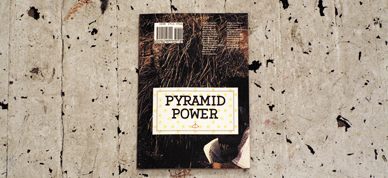only magazine
↵ home
Pyramid Power

By Asher Penn
Thursday February 15, 2007
Magazine-on-Magazine Action
Art Magazines are great because they have a high picture versus text ratio and look good sitting on your bookshelf shelf for years as a cultural souvenir. Pyramid Power is such a magazine. Based in Vancouver, Pyramid Power is made by Jonah Gray, Sacha Hurley and Matt Booth. We caught up with the editors as they were working on putting together their second issue.
ONLY: Why did you start the magazine?
Pyramid Power: It seemed like there was room for an art magazine that was critically engaged but wasn’t so serious as to forget the euphoric aspects of art.
ONLY: Why are you still doing it?
PP: We’ve only made one issue so far. There’s still a lot of ground to cover.
ONLY: What is a magazine in 2007? Is Pyramid Power a magazine of right now or of the future?
PP: Pyramid Power is a magazine for right now–for whenever you pick it up.
ONLY: You obviously care a lot about graphic design. How important is design in comparison to content? Is it a challenge to negotiate between the two? Who wins?
PP: We all do.
ONLY: Are you guys still finding yourselves, or have you found your template?
PP: We’re trying to stay away from templates, which is a challenge. But because we build each issue around the type of submissions we receive, each one will be unique.
ONLY: You guys used to work on Woo Magazine. Was that a good experience or a bad one? How has it informed your current project?
PP: Two of us worked on Woo. It was fun. The things we learned from Woo were mostly mundane things–like how to work with printers, what to expect when asking for submissions, and artists’ concerns with how their work will be treated–that have stood us in good stead.
ONLY: You are the first magazine of your kind to design all the ads for the advertisers. Why did you decide to do this?
PP: Except for a few advertisers, who specifically asked us to, we didn’t design the ads. There are a few magazines that do though. Dot Dot Dot is one. The idea of putting the ads in the back was originally to keep them from cluttering up the flow of the magazine proper. An unexpected benefit has been that people are actually more drawn to look at them now.
ONLY: How do you distinguish yourselves from other arts and culture glossies being made today? What are your politics?
PP: Well, for one, we’re not glossy. But this leads us back to the question about templates… As for politics: we’re backing Obama all the way.
